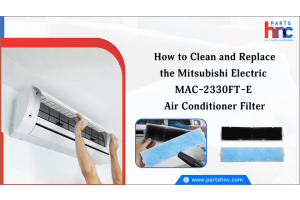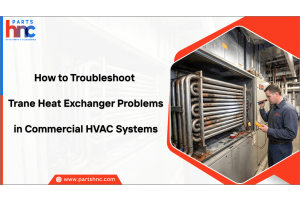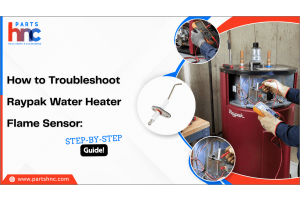Carrier AC Capacitor Issues 101: What Every Homeowner Should Know
As a homeowner, ensuring your air conditioning system runs smoothly is key to maintaining comfort, especially during the hot summer months. One often overlooked component that plays a crucial role in your Carrier HVAC system’s performance is the capacitor. These small but powerful electrical components help the motors in your AC unit start and run efficiently. However, when capacitors fail, it can lead to poor performance, higher energy costs, or even complete system breakdowns. In this guide, we’ll explore common Carrier AC capacitor issues, how to identify signs of a failing air conditioner capacitor, what causes them to fail, and tips on maintaining them to keep your system running smoothly. Stay informed and take proactive steps to prevent costly repairs.
| Table of Contents: The Role of the Capacitor in Carrier HVAC Performance Common Carrier Capacitor Issues Homeowners Face How to Identify a Failing Capacitor What Causes Carrier Capacitors to Fail? Preventive Maintenance Tips for Carrier Capacitors |
The Role of the Capacitor in Carrier HVAC Performance
Your Carrier AC system relies on multiple electrical components to run efficiently. Among these, the capacitor plays a key role in managing the system's startup and run functions.
What is a Capacitor?
A capacitor in an HVAC system is a compact cylindrical device that stores electrical energy and releases it when needed. It provides the initial boost required to start the motor and assists in maintaining its smooth operation throughout its use.
Two Types of Capacitors are Used in Carrier Systems:
-
Start Capacitors: Offers the compressor and fan motor with the extra power required to start.
-
Run Capacitors: Help maintain consistent power flow for ongoing operation.
Without a properly functioning capacitor, your Carrier air conditioner may struggle to start, underperform, or fail to operate altogether.
Why it’s Important
Your AC system's lifespan and overall efficiency are significantly affected by capacitors.
-
Energy Efficiency: Capacitors help your system operate without drawing excessive power from your home’s electrical supply.
-
Component Protection: They reduce wear and tear on critical components like the compressor, blower motor, and condenser fan motor.
-
Cost Savings: A well-functioning capacitor ensures optimal performance, helping lower energy bills and reducing the need for costly repairs.
-
Prevent System Failure: A failing capacitor can lead to interrupted cooling, and in the worst case, total system failure if ignored.
Struggling to fix your Carrier AC capacitor issues? PartsHnC offers top-quality capacitors, contactors, fan motors, and relays to keep your system running smoothly. Choose from leading brands like Carrier, Goodman, and Trane, all backed by fast shipping and expert support.
Common Carrier Capacitor Issues Homeowners Face
The carrier air conditioner capacitor issues can affect overall system performance when it malfunctions. Homeowners can identify problems early and prevent expensive repairs by being aware of typical capacitor issues.
-
Weak or Failing Start Capacitor: If your AC struggles to start or only hums when turned on, the start capacitor may be weakening. This can prevent the compressor or fan from running properly.
-
Burned-Out Run Capacitor: Run capacitors can overheat or short out, causing random system shutdowns or poor performance. A failed run capacitor can make your AC inefficient and unreliable.
-
Bulging or Leaking Capacitor: Failure occurs when a capacitor swells or leaks. This damage means the capacitor is no longer functioning as it should and needs immediate replacement.
-
Intermittent Operation: Bad AC capacitors can cause your AC to operate sporadically. During hot weather, it can be especially annoying when the system starts and stops without warning.
-
AC Won’t Start at All: If your AC refuses to start and no other issues are present, a failed capacitor could be to blame. This can prevent the compressor or fan from getting the power it needs.
-
Overvoltage or Undervoltage Issues: Overvoltage or undervoltage can strain the capacitor, reducing its efficiency. These electrical irregularities may cause it to overheat, degrade, or fail early.
-
Dirty or Blocked Coils: Clogged evaporator or condenser coils force the system to work harder, overheating the capacitor. Regular cleaning prevents excessive strain and prolongs capacitor life.
-
Power Surges: Sudden electrical surges from lightning or grid issues can overload the capacitor. This can lead to immediate failure and prevent your AC from starting.
Recognizing a capacitor issue in AC can help homeowners prevent costly repairs. Early detection of symptoms can keep your system running smoothly and efficiently.
Check out this guide on how much an AC capacitor costs to better understand potential repair expenses.
How to Identify a Failing Capacitor
Identifying a failing Carrier air conditioning capacitor is essential for maintaining the efficiency and reliability. A faulty capacitor often shows clear warning signs that, if caught early, can prevent bigger problems. Here's how you can recognize the most common signs of a failing capacitor.
AC Won’t Turn On
If your air conditioner doesn’t start when you turn it on, it could be due to a faulty capacitor.
-
Step 1: Try turning on the AC. If there’s no response, the capacitor may have failed.
-
Step 2: Ensure the power supply is active and the thermostat is set correctly.
-
Step 3: If the circuit breaker hasn’t tripped, the issue likely points to a faulty start capacitor.
Use a multimeter to test for voltage at the capacitor terminals (only if you're trained to handle electrical components safely).
Buzzing Sounds
A buzzing or humming sound when the air conditioner attempts to start is a sign that the capacitor may be failing.
-
Step 1: When the unit is turned on, listen for a buzzing sound.
-
Step 2: If the unit hums but doesn’t start, the capacitor is likely weak.
-
Step 3: Look for visible damage like bulging or leaks around the capacitor.
A capacitor tester or multimeter with capacitance settings can confirm if the µF rating is below spec.
Unexpected Shutdowns
If your AC unit starts, then shuts off unexpectedly, this could indicate a failing capacitor.
-
Step 1: Observe if the AC starts, then shuts off repeatedly.
Step 2: Note if the unit cycles quickly, indicating the capacitor isn’t holding power. -
Step 3: Switch off the system and seek expert advice.
Unusual Noises
If you hear grinding, clicking, or rattling noises from the motor while the AC operates, it’s a sign the capacitor may be failing.
-
Step 1: Listen for grinding, clicking, or rattling noises from the motor.
-
Step 2: Check if the noise happens while the AC starts or runs.
-
Step 3: If the motor is sluggish, the capacitor may be underperforming.
Runs Continuously
If the air conditioner runs continuously without shutting off, the capacitor may be the reason.
-
Step 1: Ensure the thermostat is correctly set and in cooling mode.
-
Step 2: If it runs non-stop, the capacitor may not be regulating power.
-
Step 3: Unplug the unit, wait, and then restart it. If the problem continues, replace the capacitor.
Visible Damage
Sometimes, the capacitor will show clear signs of failure through physical damage.
-
Step 1: Turn off the power and inspect the capacitor for bulges, leaks, or discoloration.
-
Step 2: If swollen or cracked, the capacitor is damaged.
-
Step 3: Replace the damaged capacitor to avoid further issues.
Struggles After Power Outage
After a power surge or outage, the AC might struggle to restart due to capacitor failure.
-
Step 1: Turn on the unit after a power outage and check for normal startup.
-
Step 2: If it struggles to start, the capacitor may have been affected by the power surge.
-
Step 3: Install surge protectors and call a technician for a full inspection.
Decreased Cooling Efficiency
A decrease in the AC’s cooling efficiency could be a sign that the capacitor isn’t supplying enough power to the fan or compressor.
-
Step 1: Check if the cooling seems weaker or inconsistent.
-
Step 2: Listen for odd noises like humming or clicking from the motor.
Step 3:The capacitor may not be supplying enough power if the motor is sluggish.
Increased Energy Bills
A sudden increase in your energy bills can be a result of a failing capacitor causing the system to run inefficiently.
-
Step 1: Track your energy bills for any unexplained increase.
-
Step 2: Notice if the system is running longer or working harder than normal.
-
Step 3: Replace the capacitor to restore normal operation and reduce energy usage.
AC Unit Won’t Turn Off
If the AC continues to run even after turning off the thermostat, it’s likely that the capacitor is stuck.
-
Step 1: Double-check that the thermostat is in the off mode.
-
Step 2: If it still runs, the capacitor might be stuck, keeping the motor “on”.
-
Step 3: Power off the unit. If it continues running, call a technician to inspect the capacitor.
Flickering Lights
Lights flicker when the AC starts, indicating a possible electrical strain from a failing capacitor.
-
Step 1: Check for flickering lights when the AC runs, which may signal electrical issues.
-
Step 2: See if other appliances in your home are affected by electrical fluctuations.
-
Step 3: Have an HVAC technician inspect the capacitor if the issue is isolated to the AC.
Delayed Startup
The AC takes longer than usual to start cooling, suggesting the capacitor isn’t delivering enough initial power.
-
Step 1: Notice if the AC takes longer than usual to cool.
-
Step 2: See if the delay happens consistently each time you turn it “on”.
-
Step 3: If delays continue, consider replacing the capacitor to fix the issue.
If your AC capacitor is not working, prompt replacement is essential to prevent performance issues and restore efficient cooling.
Check out this step-by-step guide on how to replace an AC capacitor to safely and effectively restore your HVAC system's performance.
What Causes Carrier Capacitors to Fail?
Carrier air conditioner capacitors are vital in HVAC systems, but various factors can cause failure. Identifying these causes helps prevent breakdowns and extend system life.
-
Wear and Tear Over Time: Capacitors have a limited lifespan (typically 5–10 years) due to natural degradation of internal materials.
-
Electrical Surges or Voltage Spikes: Sudden surges, often caused by lightning or an unstable power supply, can damage or destroy capacitors.
-
Overheating: Excessive heat, especially in outdoor units or poorly ventilated areas, accelerates the deterioration of internal components.
-
Improper Sizing or Installation: Using the wrong capacitor type or rating leads to stress and quicker failure.
-
Manufacturing Defect or Poor Quality: Low-grade capacitors or production flaws can result in early malfunction.
-
Lack of Maintenance: Without regular HVAC checkups, early signs of capacitor issues, such as swelling, leaking, or humming, can go unnoticed.
-
Exposure to Moisture or Corrosive Environments: Humid or salty air (common in coastal regions) can corrode terminals and internal parts.
-
Frequent On/Off Cycling: Short cycling increases the number of startups, putting more strain on the capacitor.
-
Vibration and Physical Damage: Continuous vibrations or impacts during maintenance or transport can physically damage the capacitor.
Identifying and addressing these causes early can help maintain HVAC performance and prevent costly repairs.
Preventive Maintenance Tips for Carrier Capacitors
Routine maintenance is essential for improving the lifespan and performance of Carrier air conditioner capacitors. Simple steps can reduce failure risks and optimize system efficiency.
-
Regular Inspections: Check the capacitors for leaks, discoloration, or bulging as signs of wear regularly. These are unmistakable signs that the capacitor is malfunctioning.
-
Clean the Area: Remove any dust, grime, or debris from the capacitor and its surrounding parts. A buildup of dust can lower performance and result in overheating.
-
Check for Proper Voltage: Make sure the right voltage is reaching the capacitor. Conditions involving either too much or too little voltage can cause an early failure.
-
Test Capacitor Health: Use a multimeter or capacitance tester to measure the capacitor’s condition. This can help identify if it’s operating within its specified range.
-
Ensure Adequate Ventilation: Ensure that the capacitor is in a well-ventilated area, particularly in outdoor units, to prevent overheating. If necessary, consider installing a fan to improve airflow.
-
Protect Against Surges: To avoid voltage spikes that could harm the capacitor, think about installing surge protection devices.
-
Schedule Professional Servicing: Hire an HVAC technician to perform regular maintenance, including checking capacitor performance and cleaning connections.
Implementing these tips will help keep your Carrier capacitors running smoothly, minimizing the risk of costly repairs and system downtime.
Check out how to clean an air conditioner by yourself to improve system efficiency and help prevent costly repairs.
In conclusion, Carrier air conditioner capacitors are vital for the smooth operation of HVAC systems, but they are prone to failure due to factors like aging, electrical surges, and overheating. Understanding the common causes of failure, such as wear and tear, voltage spikes, and environmental stress, can help in taking proactive steps to reduce the risk of unexpected breakdowns.
Regular preventive maintenance, including inspections, voltage checks, and ensuring proper ventilation, is essential for extending the life of capacitors. By implementing these practices and scheduling professional servicing, you can minimize the chances of capacitor failure and avoid costly repairs, ensuring optimal system performance and reliability for years to come.
FAQs
Which is the most common reason for capacitor failure?
The most common reason for capacitor failure is overheating due to prolonged use, electrical surges, or poor ventilation, which accelerates wear and tear.
How to tell if the AC capacitor is bad?
Signs of a bad AC capacitor include humming noises, intermittent operation, AC not starting, or visible damage such as bulging or leaking.
I changed the capacitor in my AC, but it’s still not working. What could be the issue?
If your AC isn’t working after changing the capacitor, the problem could be with another component, like the compressor, wiring, or the new capacitor could be faulty.
Will the AC run with a bad capacitor?
An AC will struggle to run with a bad capacitor, as it affects the motor’s ability to start and operate, leading to inefficient or no cooling.
 Loyalty Program
Loyalty Program











